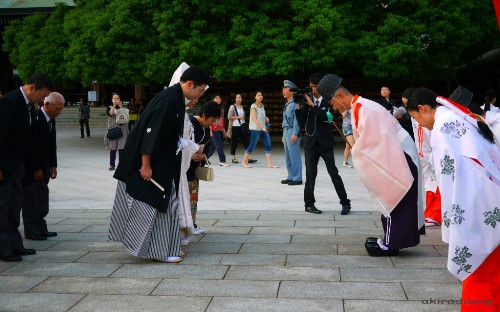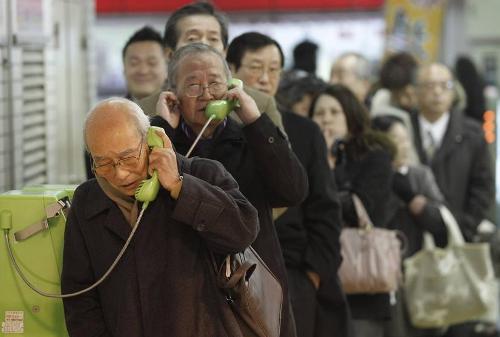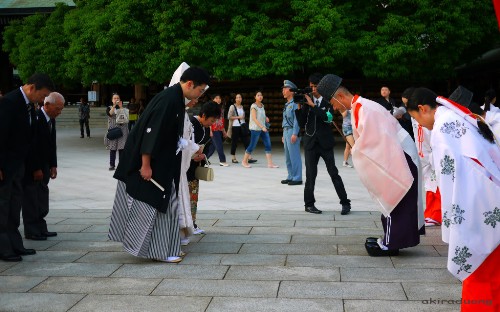1. Bow in greeting.

Instead of shaking hands like in many countries, the Japanese usually bow to greet each other, which is also a way to express gratitude and apologize. They will bow about 15 degrees for everyday greetings, about 30 degrees for more formal greetings, and 45 degrees to thank someone. So, don't forget to return the bow when a Japanese person greets you.
2. Things to note when eating
If you're at a dinner party, after getting your drink, wait for the host to finish speaking before raising your glass and shouting "Kanpai" (similar to "cheers!") as a toast. When eating, don't stand your chopsticks upright in the rice bowl, don't put them in your mouth, and don't use chopsticks to pass food. In particular, resting your chopsticks horizontally across the rim of the bowl means you're criticizing the food or indicating "I don't need any more."
Unlike other countries that use chopsticks, Japanese chopsticks, when placed on the table, are not placed straight to the right, the side of the hand holding the chopsticks, but are placed in front of the diner, with the tips of the chopsticks resting on a chopstick rest called a hashioki, facing to the left.
3. Don't give tips.
When traveling in Japan, in some places, you might be considered impolite for tipping taxi drivers, restaurant staff, or when receiving service from others. There's no need to feel guilty, as the service you requested already includes this amount. Therefore, don't be surprised if you accidentally leave a few coins on the table and the waiter chases after you to return them, thinking you forgot your change.
4. Always drive on the left.
Japan is one of the few countries in Asia that maintains the rule of driving on the left. Therefore, when traveling in Japan, you must always walk on the left side of the road. This also applies to escalators in Japan. People usually stand on the right side, leaving the left side free for those who are in a hurry or have urgent business.
5. Queueing culture

While most places in the world consider queuing a nuisance, for the Japanese, the habit of queuing is instilled from a young age. They also believe that queuing means there's something worth seeing. Queuing during festivals is also an opportunity to connect with loved ones and share endless stories. Therefore, be patient and queue when you want to attend an event with a large crowd.
6. Take off your shoes before entering the house.
Before entering any house in Japan, you must remove your shoes and leave them outside the door. Inside, families usually provide separate slippers, but this is not the case in rooms with tatami mat floors. In these rooms, you must walk on the tatami mats. This custom also applies in restaurants and hotels.
7. Payment methods
In Tokyo, it's generally not customary to hand cash directly to staff in restaurants or clothing stores; instead, you drop the money into a small tray next to them. If you still want to hand it directly out of fear of loss, especially when using a credit card, do so with both hands and give a slight nod to show respect.
8. Bathroom Culture
Public baths remain popular in Japan. Sento (residential baths) are easily found from the large neighborhoods of Shinjuku to the small towns on Shikoku Island. Onsen (hot springs) are very popular at weekend resorts.
A small note: you are only allowed into a Japanese bathhouse after you have thoroughly cleaned yourself, and then you can soak in a communal hot tub for 10-30 minutes.
9. Maintain public order and cleanliness.

In public places such as train stations, bus terminals, or on trains, you should avoid making phone calls or talking too loudly. This can be annoying to those around you. Japanese people usually put their phones on silent mode when using public transportation.
Furthermore, in Japanese culture, everyone has a responsibility to maintain cleanliness and dispose of trash properly. Therefore, although there are very few trash cans along the roadside, if you want to throw away an empty soda can, please be patient until you find one.
10. Be on time.
When attending meetings, going to work, or going to school, Japanese people are always mindful of time. If they want to visit someone, they must call ahead to ask permission and keep to the appointment time. Being late is considered very impolite and undermines trust. If you are going to be late, you must call ahead to inform others. Therefore, when attending parties or participating in tours in Japan, you must pay close attention to this rule.

 VI
VI EN
EN

































